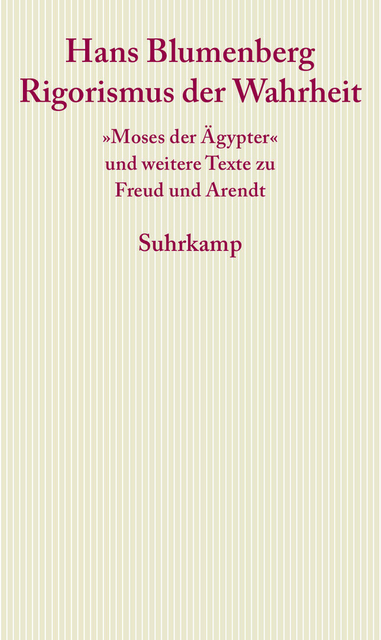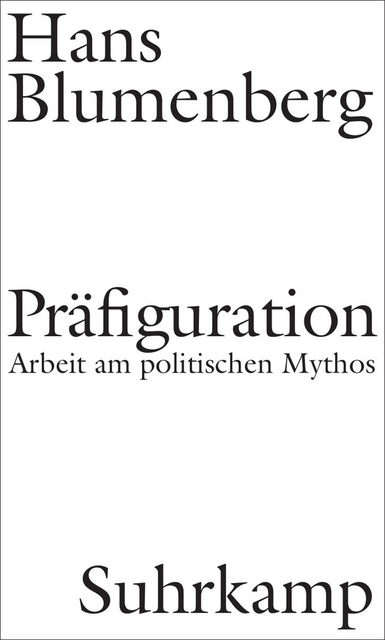(THIS ARTICLE IS MACHINE TRANSLATED by Google from Norwegian)
ESSAY
Hans Blumenberg: Präfiguration. Work in the political myth. Published by Angus Nicholls and Felix Heidenreich, Berlin, Suhrkamp Verlag 2014.
Hans Blumenberg: Rigorism of Truth. "Moses of Egypt" and other texts in Freud and Arendt. Published by Ahlrich Meyer. Berlin, Suhrkamp Verlag 2015.
Hans Blumenberg is not very well known in Norway. He was born in 1920, was a professor of philosophy at the University of Münster until he retired in 1985, and died in 1996. Blumenberg led a secluded but active life in the book world. He was perceived as an outsider, but nevertheless maintained extensive correspondence with many of Germany's leading intellectuals.
One of his earliest works, Metaphor and thinking (1960), was published in Norwegian in 2002 with an introduction by Eivind Lilleskjæret. brick The legitimacy of modern times (1966) was probably the book that really made him famous. None of the books he published during his lifetime, however, were suitable to reach a wider audience. But after Blumenberg's death, more titles have already been released than in his lifetime. He left behind a huge material that is now deposited in the German Literature Archive in Marbach. Every year, posthumous releases are published based on his scripts. In fact, these books are often more readable than those published by Blumenberg in his lifetime: shorter, more pointed and not so overloaded with historical references. In addition, they are provided with long extensions by the publishers. This makes Blumenberg more accessible.
Freud and Arendt. This year's book carries the title The rigor of truth. Blumenberg makes an unusual compilation of Freud's latest book on Moses and monotheism, and Arendt's scandalous publication about the trial of Nazi criminal Adolf Eichmann in Jerusalem from 1963. (Many will remember Arendt's engagement with Eichmann from Margarethe von Trotta's film about Arendt (2012) with Barbara Sukowa in the lead role.)
Blumenberg's compilation of Arendt and Freud is based on an analogy: How Freud i The man Moses and the monotheistic religion (under publication at Vidarforlaget), the Jews deprived their ancestor of Moses by claiming that he was really an Egyptian – thus Arendt deprived the state of Israel Eichmann as a kind of negative national hero, by claiming that his wickedness was simply banal. Blumenberg is obviously personally involved in the issue. As a half-Jew, he was interrupted by his studies and interned during the war.
Blumenberg does not support the idea of enlightenment that we can rationalize away from myth. In both Freud and Arendt, Blumenberg sees a rigorism that appears in the name of truth, but which turns into recklessness because it turns blind to the political and deaf to the incomprehensible.
Arendt ignored the mythical dimension of the Eichmann process, Blumenberg argues. Like most others, he was upset that Arendt partly blamed the Jewish leaders, who "almost without exception cooperated in one way or another, for one reason or another, with the Nazis." At the same time, Eichmann was demoted and turned into a bureaucrat. The result was that Arendt's moralism weakened the mythical power of the Eichmann process.
Motivational power. This input from Blumenberg will certainly be commented upon extensively in the debate over Arendt's role in the Eichmann process, which is far from over. New books are constantly coming up on the topic. (Some of them were recently discussed by Corey Robin in The Nation, www.thenation.com/article/trials-hannah-arendt/.) Blumenberg thus accepts that politics has a mythical dimension. This is a difficult, not to say unpleasant, topic. For most, such thoughts will give associations to right-wing ideologies. But in a more subdued variant we also find the mythical in the right-wing people's defense of the royal house as an institution: The nation needs a representative who gathers the people. One can also think of anarcho-syndicalist Georges Sorel's (1847–1922) emphasis on workers' myths of revolution and general strike, what he calls "myths of victory", as unifying and action-motivating. But Sorel also inspired fascist ideology.
The role of the mythical horror example in democracy should not be underestimated – perhaps this is one of the reasons for the still almost manic dealings with Nazism, 70 years after the end of World War II: In a narcissistic culture, a powerful rice is needed behind the mirror to motivate democracy.
The relationship between myth, religion and politics is thus still a topical issue, and not only in the case of Islamic fundamentalism. Karl Löwith perceived in Meaning in History (1949) The Dream of a Political Utopia à la Communism as a Secularized Variation of Augustine's State of God. Blumenberg in his theory of modernity went a different way. If modernity was conceived as a result of secularisation, the process could in principle be reversed – ie sacralized – and the modern age would lose legitimacy. In his main work The legitimacy of modern times he tried to show that the new age existed in its own right. The basis for this was, among other things, that the myths could not be rationalized. But how far does Blumenberg's defense of the myth extend? Then the brick Work on Mythos came out in 1979, there were several who criticized him for denying the political dangers of mythical thinking, including the famous German intellectual Karl Heinz Bohrer.
Idealized past. Here comes last year's Blumenberg release: Prefiguration – work on the political mythos. The publishers emphasize that Blumenberg opposes an Enlightenment thinking that will completely overcome the myth – his program, on the other hand, consists in a civilization of the myth. Blumenberg emphasizes mythic versatility in support of a liberalist distance to the mythical. This view goes against an instrumental exploitation of the myths found in totalitarian ideologies. Mythical meaning production is ubiquitous, according to Blumenberg. Not through denial, but through documentation of the myths, they also become possible to criticize.
Blumenberg takes up an interesting and frightening feature of political mythology – namely that a political utopia seeks to repeat an earlier state.
In the book on prefiguration, Blumenberg addresses an interesting and frightening feature of political mythology – namely that a political utopia seeks to repeat an earlier state. The Norwegian Nazis wanted to go back to the Middle Ages; after this, Norway had been in decline, Quisling and Gulbrand Lunde thought. Anders Behring Breivik wanted to turn the clock back to the 1950s, and in addition re-establish the Crusaders as an ideal. This creates mythical connections between two historical phenomena. By reviewing Goebbels' diaries, Blumenberg clearly shows how reality worksorienteringone completely fails the German Nazis towards the end of the war. Hitler clings more and more to the resemblance to his role model Frederick the Great (the "prefiguration"). On February 28, 1945, Goebbels recounts a conversation with the driver: “We must be as Frederick the Great was, and behave accordingly. The Driver completely agrees with me… The stoic-philosophical attitude towards people and events that the Driver now takes on is also very reminiscent of Fredrik the Great. »
When clinging to a historical model in this way, the actions easily assume pathological dimensions. But prefiguring is also an aid to how we act, which we all use: You look for something in the past that is similar to the situation you are facing, and then use this analogy as support to make a decision. But if one expects identical results from the two actions that are similar, the attitude becomes history Magic.
Prefiguration requires an analogy. Such similarities between the past and the present are important for all actions that are not governed by scientific laws, and this includes politics. Thus, according to Blumenberg, myth formation is an indispensable part of practical life, in situations where one is forced to act, but always on a failing basis. Blumenberg reveals Hitler's mythology of himself as a new Fredrik the Great, but, on the other hand, uses an analogy between Freud and Arendt to criticize their rigid relationship with the truth.
Unpublished. The exchange of letters between Blumenberg and the right-wing philosopher Carl Schmitt (1888–1985) was published in 2007. In 2013, the letters to and from the religious philosopher Jacob Taubes (1923–87) were published. But most of the twenty boxes of correspondence Blumenberg left behind, most are still unpublished – including correspondence with Theodor W. Adorno, Hans-Georg Gadamer, Hans Robert Jauss, Reinhart Koselleck and Karl Löwith, to name some of the best known names . In the future, a number of books of the type we have mentioned here will also be published, based on manuscripts left behind.
Since Germany is not exactly overflowing with original philosophers at the moment, Blumenberg's significance will certainly increase in the years to come.



